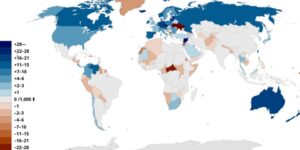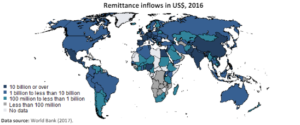Countries are reviewing and changing their immigration policies to attract foreign talent and wealthy expatriates. They’re trying new strategies like family visas, permanent residency, and job programs. In this article, we will explore how these policies are changing in different countries.
Humanitarian and Refugee Resettlement Programs
It actively helps people who flee from conflict or danger. These programs offer them homes, education, healthcare, and job assistance, allowing them to restart their lives safely. This support shows unity worldwide and protects the rights of displaced individuals.
Impact of COVID-19 on Global Immigration Policies
- COVID-19 led to travel restrictions and border closures, impacting global immigration policies.
- Many countries implemented health screenings and quarantine measures for incoming travelers.
- Immigration processing times increased due to reduced staffing and operational challenges.
- Remote work visas gained popularity as people adapted to virtual work environments.
- Governments prioritized public health measures while balancing economic and immigration needs.
Saudi Arabia’s Premium Residency Revolution

Innovative Residency Paths: Saudi Arabia’s Premium Residency program has unveiled five new pathways aimed at attracting diverse talents, including entrepreneurs, investors, skilled professionals, and individuals with exceptional abilities. These pathways offer extended residency privileges and foster economic contributions from expatriates.
Lifting Entry Bans: The recent decision to lift the three-year entry ban for expatriates signifies Saudi Arabia’s commitment to enhancing mobility and fostering a welcoming environment for foreign talents. This change aligns with efforts to streamline visa regulations and promote compliance among expatriate communities.
Kuwait’s Strategic Immigration Initiatives
Family Visa Advancements: Kuwait’s forthcoming family visa program targets specific professional categories, such as healthcare professionals, educators, and technical experts, allowing them to bring their families and contribute to Kuwait’s development. The program aims to improve the quality of life for expatriates and promote long-term residency options.
Job Creation Drive: With over 1,000 new job opportunities across various sectors, Kuwait is actively balancing its nationalization policies with the need for foreign expertise. These job openings, including specialized roles in engineering, healthcare, and technology, highlight Kuwait’s commitment to a diverse and dynamic workforce.
Australia’s Immigration Evolution
Australia’s decision to phase out the Golden Visa program underscores a strategic shift towards prioritizing skilled migration and addressing labor market demands, including the Job Seekers Visa Australia program. The focus on skilled worker visas reflects Australia’s long-term economic goals and commitment to talent retention.
Recent amendments granting greater flexibility for working holiday visa holders and the Job Seekers Visa Australia program showcase Australia’s responsiveness to evolving workforce needs. The expanded scope for remote work and extended visa privileges align with efforts to attract and retain skilled professionals in key industries.
Denmark’s Talent Acquisition Strategies
Denmark’s updated positive list emphasizes critical occupations essential for economic growth, such as healthcare professionals, IT specialists, and engineering experts. The streamlined visa processes for skilled workers demonstrate Denmark’s proactive approach to talent acquisition and retention.
Bulgaria and Romania’s Schengen Integration
The partial integration of Bulgaria and Romania into the Schengen area marks a significant step towards enhanced regional mobility and economic collaboration. While limitations exist initially, the move signifies progress towards broader European integration and streamlined travel within the EU.
Finland’s Immigration Policy Adjustments
Finland’s revised financial requirements for short-stay travelers aim to ensure adequate financial resources during visits, promoting responsible tourism and enhancing visitor experiences. Additionally, fee adjustments for immigration-related applications reflect Finland’s commitment to efficient and transparent visa processes.
United States Immigration Fee Adjustments
The United States’ fee adjustments for premium processing highlight ongoing efforts to streamline immigration procedures and maintain service quality. These adjustments reflect market realities and ensure the sustainability of immigration services.
Canada’s Student Visa Caps and Work Experience Reforms

Student Visa Limitations: Canada’s decision to cap student visas reflects a strategic approach to managing educational resources and addressing housing challenges. The focus on quality education and sustainable enrollment levels supports a conducive learning environment for domestic and international students.
Work Experience Elimination: By eliminating work experience requirements, Canada aims to attract highly skilled professionals and facilitate their integration into the Canadian workforce. These reforms signal Canada’s openness to diverse talent and its commitment to a fair and inclusive immigration system.
France’s Immigration Law Updates
France’s revised immigration laws prioritize support for international students, ensuring equitable access to educational opportunities and enhancing cultural diversity within academic institutions. The reforms promote international collaboration and academic excellence.
Singapore’s Economic Stimulus through Immigration
Singapore’s strategies to attract foreign investors emphasize collaboration, innovation, and sustainable economic growth. Initiatives such as the Jurong Innovation District demonstrate Singapore’s commitment to fostering a vibrant business ecosystem and global talent integration.
United Kingdom’s Border Control Innovations
Facial Recognition Implementation: The UK’s adoption of facial recognition technology enhances border security while streamlining entry procedures for travelers. Ethical considerations and privacy safeguards accompany these technological advancements to ensure responsible usage.
Tourist Visa Work Provisions: New provisions allowing tourist visa holders to engage in remote work promote tourism resilience and economic diversification. These measures support flexible travel experiences while aligning with the UK’s economic priorities.
Brazil’s Visa Requirement Postponement
Brazil’s decision to postpone visa requirements underscores its commitment to facilitating tourism and fostering positive diplomatic relations. The extension allows for streamlined visa processing and enhances the overall visitor experience.
Kosovo’s Visa-Free EU Travel
EU Mobility Agreement: Kosovo’s visa waiver agreement with the EU promotes cross-border mobility, cultural exchange, and economic cooperation. The agreement enhances Kosovo’s regional connectivity and opens doors for enhanced collaboration.
Top African Cities for Expatriates
Mercer Institute‘s rankings of top African cities for expatriates provide valuable insights into quality of life, business opportunities, and cultural vibrancy. These cities serve as attractive destinations for global talent and investment, fostering growth and innovation.
Diversity, Equity, and Inclusion in Immigration Policies
- Diversity is emphasized in immigration policies to promote cultural richness and varied perspectives.
- Equity measures ensure fair treatment and opportunities for all immigrants, regardless of background.
- Inclusion efforts aim to integrate immigrants into society, fostering a sense of belonging and participation.
- Policies may include language support, anti-discrimination measures, and cultural awareness programs.
- These policies strive to create welcoming and inclusive environments for immigrants to thrive.
Frequently Asked Questions (FAQs)
Q: Why are humanitarian and refugee resettlement programs important?
They provide crucial support like housing, education, healthcare, and job assistance to refugees, aiding their safe resettlement.
Q: How has COVID-19 impacted global immigration policies?
It led to travel restrictions, health screenings, and longer immigration processing times.
Q: What are the new pathways in Saudi Arabia’s Premium Residency program?
They target diverse talents like entrepreneurs, offering extended residency privileges.
Q: What strategic initiatives has Kuwait taken in immigration?
Kuwait introduced a family visa program and created over 1,000 new jobs.
Q: How has Australia’s immigration policy evolved recently?
It phased out the Golden Visa program and gave flexibility to working holiday visa holders.
Final Thoughts
Global immigration policies are constantly evolving to adapt to changing circumstances and priorities. These policies play a vital role in shaping the movement of people, addressing economic needs, and ensuring the safety and well-being of individuals.
By embracing diversity, equity, and inclusion, countries can create more welcoming environments that harness the talents and contributions of immigrants, ultimately fostering growth, innovation, and mutual understanding on a global scale.
“Apply2migrate makes immigration easier with complete solutions, helping with visas, real estate, and moving. Our skilled team ensures a smooth process and high visa approval rates for investors, entrepreneurs, job seekers, and others.”


